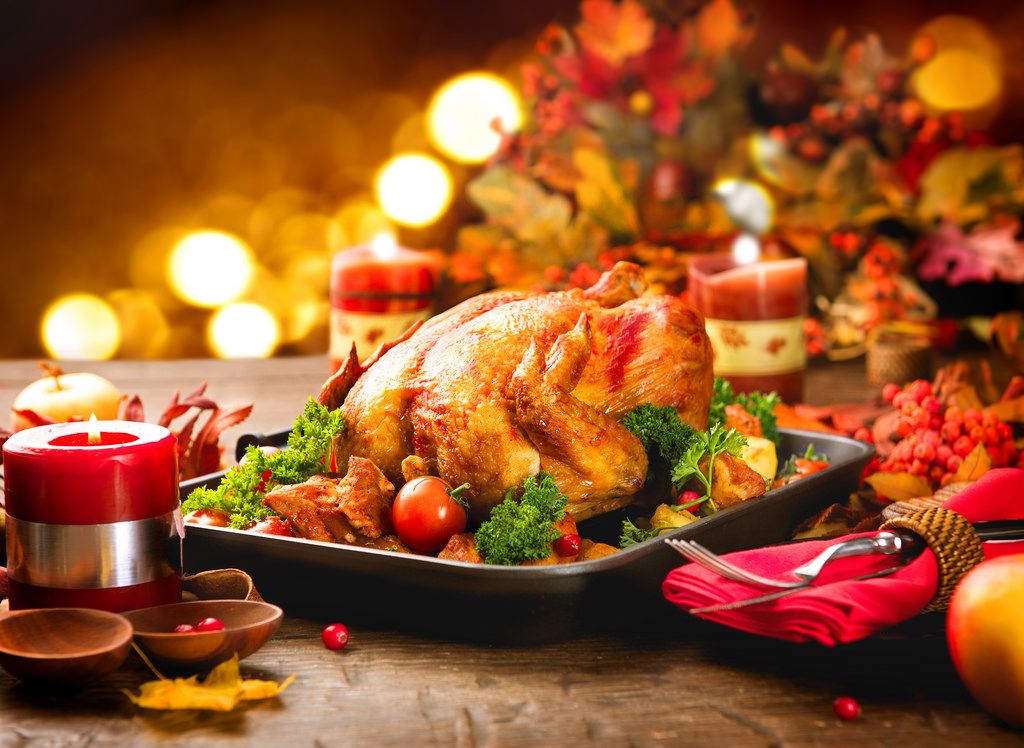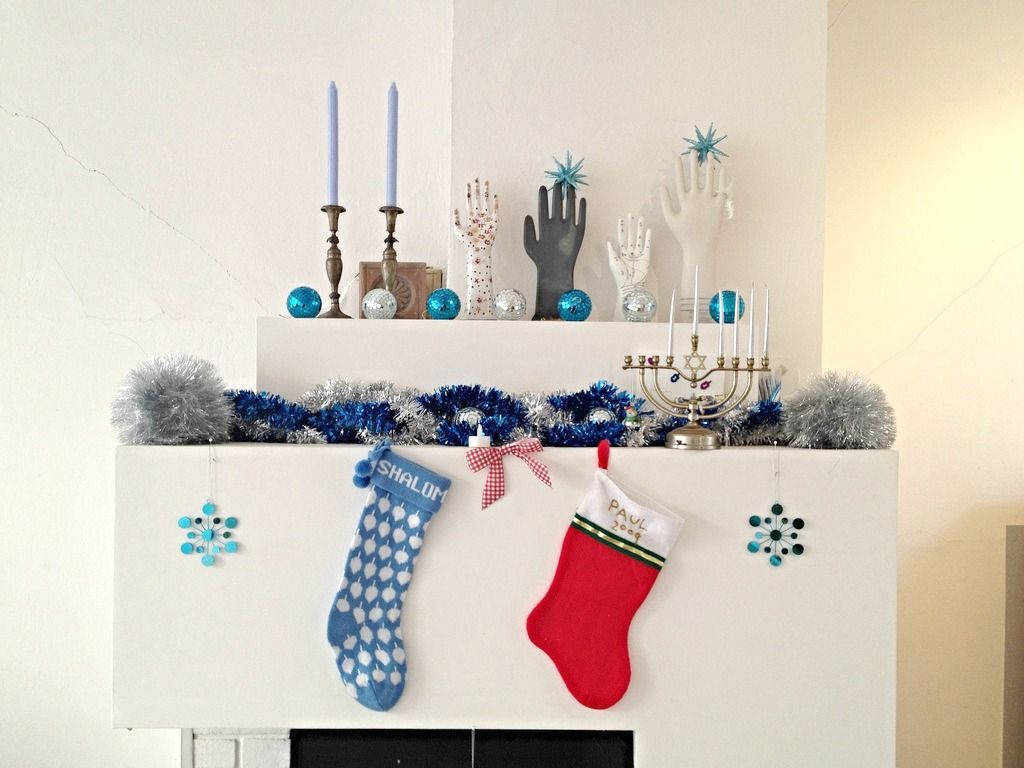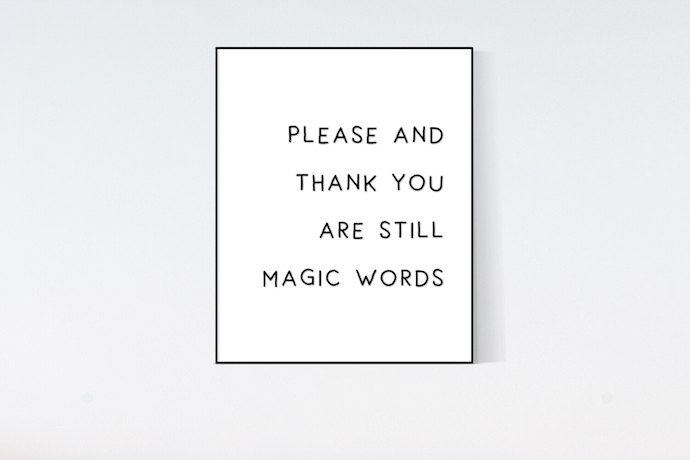Please and thank you — important stuff, right? I’ve always believe that courteous kids grow into nice adults and we all need more nice in the world these day. But that’s not where etiquette begins and ends.
So with the holidays here, and lots of entertaining and mingling coming up on our calendars, we’ve started talking in our home about some of the manners that we want our kids to know, so they can be fantastic guests and hosts. I’m sharing them here with the hope that maybe our ideas will help some of you too.
Top: Please and Thank You poster at TanyaGDesign on Etsy
I know there’s a lot of talk about kids and etiquette (or lack thereof) these days, and I definitely don’t want to be judgey. I mean, I get it! My own kids can find it tricky just to remember which houses allow running and screaming. But I do think that there are some rules of etiquette and basic manners that we can all try and remember to teach our kids that go a long way in the world, starting with our own friends and family.
And hey, if they can’t get them mastered this week, maybe they’ll nail them before Christmas? We can only hope!
Related: Books about manners for kids: 6 excellent options, just in time for the holidays
1. Learn how to greet people.
I know it can be nerve-wracking for children to introduce themselves to someone new, but if they can make eye contact, stick out their hand, and simply say, “Hello, I’m Annie,” it makes a big difference.
So talk to your kids about how important first impressions can be. And how with a lot of adults, when they see a kid behaving politely and respectfully right from the first encounter, the child will be afforded more respect in return.
Of course for those friends and family your kids already know, a polite greeting still applies. It’s not that they can’t high-five their uncle or run and jump in Grandma’s arms. It’s not Downton Abbey after all! But we can talk about being sure to come to the door to say hello when someone enters a room.
2. Learn how to be a good host to other kids.
If you’re hosting a dinner at your house, remind your kids that they’re hosts too. That simple message works wonders! Then, let the kids act out their role by delegating jobs like answering the door, taking coats, or even offering to take care of little cousins and neighbors so parents can visit or help to get the food ready.
But above all, remind your kids that it’s their job as host (doesn’t that sound fancy and awesome?) to make sure other children have a great time. When you present it that way, kids are likely to take the responsibility more seriously.
Some ways to do this:
*Invite all kids to join in on an activity; be sure to include kids who seem shy or skeptical or playing on their own
*If other kids don’t want to participate, learn how to say, “that’s okay maybe we can try something else you’ll like later.”
*Ask their cousins or friends what games they want to play instead of setting the agenda.
*Offer to let others have the first turn, go ahead of you in the buffet line, or pick a seat at the table first.
*Ask questions to engage guests. I always prep kids with a few for their pack pockets: Did you go on vacation this year? How is school? What’s your favorite Thanksgiving food? What are you doing over the Christmas break?
Just tell kids that being a great host is about putting others first. When you put that into words, kids are so good at it!
3. Learn how to behave at the dinner table, beyond using the right spoon
Yes we all want our kids using the right forks, not slurp soup or use sleeves as napkins. (Let alone not smashing glasses into bits when someone offers a toast!) But I think as parents we often forget to talk about the social kindnesses that, in my opinion, are even more important.

Yum, holiday dinner: LuminaryPhotoProject Flickr via Compfight cc
Learning how to behave around what might be less familiar food choices is essential. The good thing about Thanksgiving dinner in our family is that there are usually 1,001 food options to choose from, so it shouldn’t be too hard for even our pickiest eaters to find something they like! Still, every year, I take a moment before dinner to remind my kids of our cardinal rule: no complaining about the food out loud.
I know that’s a tough one for kids, but especially if you’re in a situation where lots of other people may have spent time on the food, no one wants to hear, “blech” about their roasted brussel sprouts recipe. (Which are probably delicious by the way, if you ask Liz!)
And hey, older kids can even go one step further and compliment Aunt Sally on her pumpkin pie or tell Grandpa that his sausage stuffing rocked, guess who will be particularly grateful?
Related: What manners do kids need to know? A frank, fun discussion on Spawned
4. Learn to help out before being asked.
Yes, this one benefits me (and other holiday hosts) in particular, but it’s so great for children learn to ask the host, “How can I be helpful to you?” It’s being proactive that makes a huge difference.
Prepare kids for a variety of answers, by the way. Some cooks may welcome help in the kitchen or setting the table, others may just need babysitting help for younger kids to keep them all out of the way. And hey, some hosts may be a little snappy if they seem particularly frazzled at the moment and kids should know that’s not about them.
But beyond asking what can be done, I’m a big believer in teaching my kids to take action — without asking — if they see something that needs to be done.

If the trash bag is full, take it out. If the coats are on the floor, hang them up. And if the littlest cousins made a mess with the five hundred and zillionty-five LEGO piece set, help them clean up. If you see dishes in the sink, get on it kids! Wash them up and make room for more!
For more ways your kids can help, around the house, check out our guide to chores for kids by age group.
Parent tip: We should be sure to thank and acknowledge our kids when we see them hard at work. You’re likely to get more action from them in the future when you recognize their contribution — however big or small. Kids like rewards, right? Well it doesn’t always have to be a star sticker or a trophy.
5. Learn how to take a compliment.
Why is this so hard for kids these days! A family member will mention how big the kids have gotten, or how pretty they are, and in return, the kids will just stare at their feet in embarrassment.
Not every kid is comfortable with a gushing compliment — let alone a pinched cheek, ugh — so it’s good to role play and give kids very specific responses they can use. Arm them with a quick, bright, credible “thank you” they can have at the ready like, Thank you. That’s so nice of you! Role play beforehand if that’s helpful.
And don’t forget the eye contact!
Then, of course, they’re allowed to run back to the safety of other kids who aren’t trying to muss their hair or fuss over their accomplishments.
6. Learn how to say a proper goodbye.
One of my very favorite parenting books is The Blessing of a Skinned Knee by Wendy Mogel. It’s been a good five years (or more) since I last read it, but I still remember her encouragement to have your children walk their grandparents or other visitors to the door to say goodbye.
Sending someone off with the feeling that they’ll be missed is a real act of kindness.
On the other hand, shouting “Bye!” over your shoulder while you’re on the iPad doesn’t exactly send that message.
Last impressions are just as important as first ones, so teaching kids how to give a proper goodbye to those we love really matters — a lot. And let them know that when it comes to cousins and friends, and others they know well, adding a hug or a silly secret handshake to that goodbye is absolutely appropriate. And probably the perfect end to a holiday visit.
7. Learn to respect everyone’s differences.
Hopefully there’s lots of talk about this from when kids are very young, but we especially have opportunities to honor diverse beliefs and traditions over the holiday time. If you don’t celebrate Hanukkah or Christmas, but someone wishes your child a happy one? Teach them to simply say, “thank you!”
(“We don’t celebrate that” may be how a lot of kids are inclined to respond but… probably not the ideal choice.)

Christmukkah! Via Lynn Friedman Flickr via Compfight cc
If they don’t understand someone else’s traditions, it’s okay to ask politely — in fact, it’s wonderful to show curiosity and engagement. There are plenty of adults who don’t understand what all the sides of the dreidel mean either, or how Kwanzaa is celebrated, or how Santa gets into a NYC apartment building.
Also, different people approach Thanksgiving or other holiday celebrations differently based on their own cultural and family traditions. Let kids know that just because someone doesn’t do the very thing that we do, doesn’t mean it’s “weird” or wrong. Help them see the fun in exploring different kinds of celebrations from different families and they’ll see it as a big adventure.
When it comes down to it, etiquette is really just about being kind, being respectful, and making everyone feel good and feel comfortable And there’s no better time to put those lessons to use than the holidays right?
Now bring on the pie!





